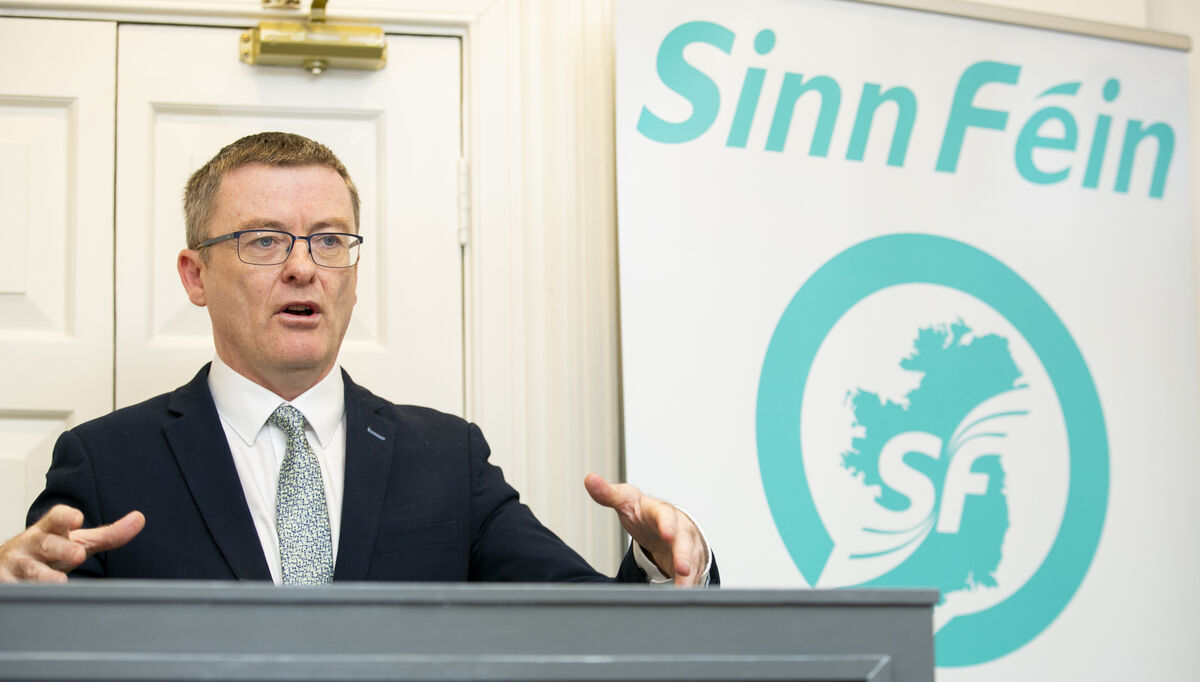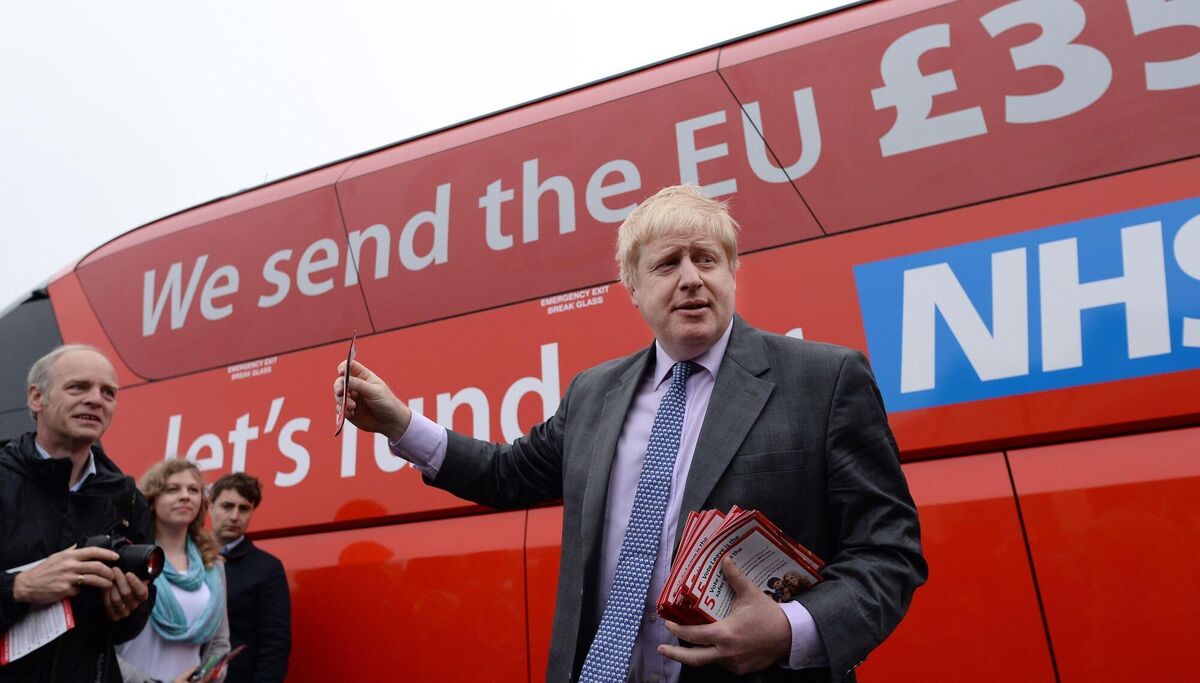Terry Prone: Sinn Féin paying homage to what the Brits used to do right

Staff on a NHS hospital in London:
Is this what Sinn Féin is promising us? An imitation of a faltering system;
a faltering British system.
Sinn Féin telling us they’re going to give us a National Health Service (NHS) after two stretches in power must be really encouraging to young voters.
The older generation might have reservations. Not being gruesome or anything, but if the law of averages kicks in, we mightn’t be around to relish a revived and reformed health system when — or if — it happens.
Sinn Féin maintains that every move they’ll make has been costed. This costing claim is designed to fend off the question from current affairs interviewers: “But what will all these great plans cost?”
SF obviously believes that having a numerical answer solves that one.
One wonders where they’ve been during the building of the new National Children’s Hospital, which has established that costs in the public service are subject to an elaboration of the ‘how long is a piece of string?’ question.
More like ‘how long is a rubber band?’. And if you’re BAM, the answer is ‘as long as infinity and beyond’. Sinn Féin, therefore, is — unexpectedly — fighting yesterday’s battle with yesterday’s weapons.
But still, come on, wouldn’t it be fantastic to have something like the NHS? The great source of pride to Britain for decades. The achievement admired worldwide, except perhaps on the Republican side in the US, where it is seen as the worst kind of socialism, encouraging sick poor people to believe that the state should take responsibility for getting them better and not cost them an arm and a leg in the process.

And while the Republicans are at it, they would also point out that in the NHS, buying health insurance doesn’t get you priority. Which means a reduction in health insurance tariffs paid to companies that have a God-given right to make profit from the privileged unwell.
Of course, right now, the Republicans are saying very little about healthcare because the lead contender for the presidency got away with millions of covid deaths on his last go-around, a majority of them among the poor, obese patients you’d expect to condemn Trump and put him bottom of the electoral class.
The survivors haven’t done that, though, and so — other than almost absent-minded promises to abolish Obamacare any day now — the Republicans are concentrating on issues that don’t so much represent needs as wants. Republican voters want entertainment, someone to hate, a bit of excitement.
But let’s go back to Sinn Féin and its surprising homage to what the Brits used to do right.
Minister O’Malley decided it. He didn’t consult, even with the government secretary, Dr TL Whittaker. He announced it. It was then implemented and Ireland was changed, changed utterly.
The NHS was an astonishing strike for equality, filled with courage, determination, and confidence in the UK government’s ability to create and run stuff. Nothing before or since matched it, in Britain.
Roosevelt’s New Deal preceded it but New Deal’s perceived success arguably had more to do with rhetoric and the need to believe than it had to do with the efficacy of the initiative itself.
The NHS, though, had little in the way of rhetorical launch support. No fireside talks to the nation. It just happened and became so important a thread in British identity that at the time of the London Olympics, it was the centerpiece in the television introduction seen by billions across the world.
This brings us, somewhat circuitously, to the length of women’s hair. It is a truth universally acknowledged among women that it’s in the three days just before your hair gets too long that people tell you it’s perfect.
Similarly, that pride-filled pageant starring the NHS, happening in summer 2012, came just before faith in the service began — with good reason — to wane.
So swiftly did it wane because of scandals, waiting times, and understaffed hospitals, that Boris Johnson used it as a key platform in his Brexit strategy, which could have been called ‘Make the NHS Great Again’.

Johnson played with figures to sell the public the notion that, once Britain had kicked the pesky Europeans to touch, they’d have so much money in their Union Jack piggy bank as a result of not having to pay for the straightening of bananas, they’d be able to pour billions into the NHS and everybody would enjoy wonderful and instantaneous healthcare from that point on.
Just eight years after they had been hammering home their international statement of pride in the definitively British institution, that institution had been repositioned as a problem so serious as to justify the historic ending of their continued membership of the European Union. That continued, post-Brexit.
It doesn’t matter at which end of the political continuum resides the mainstream media you consume. To the left and right is a consensus that the NHS is currently ropy.
Just a few weeks ago, for example, the right-wing ran with this: “The NHS is so overwhelmed that it is having to resort to “rationing” vital care, like operations, a former health minister has warned. Lord Bethell said the health service “can’t possibly cope” in future…”
Meanwhile, just before this weekend, the left-wing led on this one: “One in three life-or-death 999 ambulance calls in some parts of England are not attended by a paramedic, NHS figures obtained by the reveal.
“The disclosure has prompted fears that seriously unwell or badly injured patients may receive inadequate care from a less-qualified member of ambulance staff lacking a paramedic’s skills.”
Of course, tonal differences exist within the coverage offered by the two newspapers. Lord Bethal wants the citizens to get their act together, eat right, give up smoking/vaping, and quit drinking (except maybe for high-end wine with high-end meals). That would put less pressure on the system.
The concentrates on the failures of the system rather than the failures of the consumers.
Indeed, the serial baby killer working within the Countess of Chester Hospital personifies a pivotal problem within NHS.
Indeed, she personifies a problem common to many health systems, one referred to recently on this page by Fergus Finlay: governability.
Analysis of the morbidity and mortality statistics among newborns at the hospital established that the overwhelming majority of disastrous incidents and deaths happened when a nurse named Lucy Letby was present. When added to her strange behaviours towards newly bereaved parents, this confirmed suspicions that she was instrumental in the deaths.
Data. Analysis. Experts. All lined up together, and yet the powers that be in this particular hospital decided to ignore all three and make the accusers apologise to the mousy and later convicted murderer. A collision of protocols and protections made the hospital ungovernable. As is much of the NHS today.
And is this what Sinn Féin is promising us? An imitation of a faltering system; a faltering British system.






